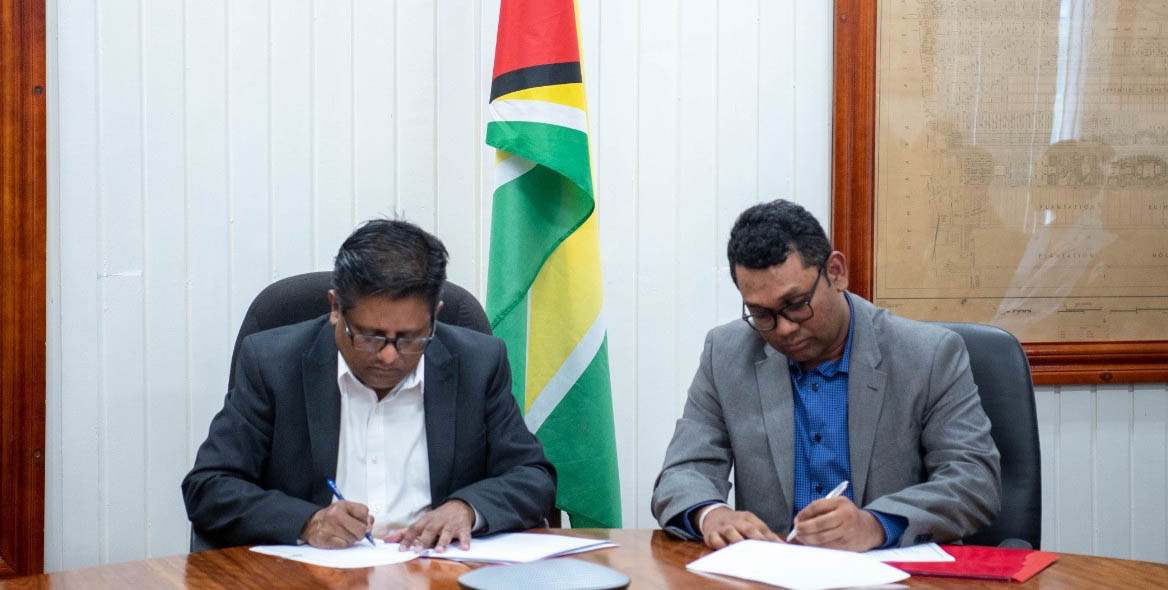The government and Demerara Bank Limited (DBL) yesterday signed a Memorandum of Understanding (MoU) solemnizing an announcement that had been made in October by President Irfaan Ali of a collaboration by the two sides in a $900m revolving fund for the forestry sector.
Senior Minister in the Office of the President with responsibility for Finance, Dr. Ashni Singh signed the MoU on behalf of Government. Signing on behalf of DBL was its General Manager, Dowlat Parbhu.
A release from the Ministry of Finance said the aim of the revolving fund is to increase production in the forestry sector and value added content. When he had made the announcement on October 28th, Ali had said that the Government’s intention was to increase its focus on small, medium and community loggers.
The release said that the establishment of the Fund is expected to address some of the challenges faced in the forestry sector in terms of the availability of easily accessible, low cost financing, especially for small scale operators.
The $900 Million Revolving Fund comprises a commitment of $300 Million by the Government of Guyana and a further $600 Million by DBL to address forestry sector challenges.
Speaking during the ceremony, Singh reiterated that despite Guyana’s economy growing due to the oil and gas sector, the government remains committed to ensuring that the country’s economy is also diversified and resilient.
“Naturally oil and gas will be driving a lot of the incredibly exciting economic growth that we’re seeing in Guyana, in 2022 we’ll see our economy grow in excess of 50 percent of real terms and in 2023 we are going to see our economy continuing to grow by an astronomical 25 percent or thereabouts and this is expected to continue into the medium term based on current proven reserves comprised of 11 billion barrels of oil but of course exploration is still ongoing…,” he added.
He said that in keeping with Guyana’s pioneering Low Carbon Development Strategy (LCDS) which has resulted in Guyana being the first country to sell certified carbon credits under a voluntary platform, the country has already earned US$75 Million.
Noting that access to finance has been a problem for small loggers in Regions 1 and 10 in particular who are in need of same to capitalize or to recapitalize their operations as well as the need for available concessions to produce, Minister of Natural Resources Vickram Bharrat who witnessed the signing noted that the Forestry sector is in a better position than it was when Government returned to office in 2020 and that to date the GFC has allocated over 100 concessions to local, small Guyanese loggers.
Bharrat reminded that Government also has a housing project initiative with Barbados and St. Vincent and the Grenadines and the boost to the forestry sector for further production through the MoU initiative signed yesterday would assist in ensuring that there will be a further increase from that in 2022 and more production in the years beyond.
Parbhu, according to the release, said that the Bank was pleased to partner with Government in the initiative. He pointed out that the Bank has been supporting a number of sectors including agriculture, alluding to the launch of the Farmers’ Credit Line which provides loans to farmers for up to $1.5 Million at a very concessional rate. He noted that almost 300 farmers have been loaned money from the last crop and this has helped many to return to the fields which in turn helps the sectors in Guyana which depend on rice especially.
“Today we are ensuring that for another sector in Guyana credit is available,” he added as he thanked President Ali for the initiative.
Ali, in October had said that financing through the Fund would be provided at an affordable interest rate of 4 percent and that Government would work in conjunction with the bank to prequalify persons based on recommendations from the GFC following which a system would be put in place to provide access to financing. He had also emphasized that his Government is committed to supporting small, medium and community-based loggers but that there must be “clarity, good governance, transparency, accountability and a system that works”.





